As we often say, you can pre-order anything from us at any time. Except for those books that are self-published by authors or outfits that don’t work with real bookstores, we are always ordering new titles and pre-ordering not-yet-released/forthcoming ones. If it is a real book from a bone fide publisher, we’re on it! We curate a pretty wide selection of all kinds of books, religiously oriented and not, fiction and nonfiction, seriously academic and lightly poppy, kids picture books and YA novels. If you wonder if we stock — or, more importantly, if we can quickly order something for you — don’t hesitate to ask. We can help.
Several customers have been chomping at the bit to pre-order a few forthcoming books that they know we will care about. So here is a big list of some of the most important upcoming titles.
This is a good thing to pre-order items, by the way, as it allows us to place somewhat larger orders from the publishers who then realize there may be a demand for this particular title. It alerts them. Orders from our shop in our south-central Pennsylvania town are, we are told by some publishers, may be some kind of bellwether for what at least a certain market demographic may want.
We seem to illustrate to those watching that there are faith-based customers who care passionately about significant books that are not necessarily on the religious best-seller list, packed as it is with positive thinking and prosperity books by megachurch preachers, end times procrastinators, and purveyors of the distinctively un-Christlike stuff of much of the religious right. In any case, we’re grateful for your orders and your support.
So, we here offer announcements about a Baker’s dozen of great books that we hope you will consider pre-ordering from us. Not only will you be delighted to get these books as soon as they are released, but you will be helping these authors and publishers, voting with a bit of your own disposable income, showing your support for this calibre of quality publishing. We can help you do this. Just click on our order form link at the end of this newsletter – we’ll take care of the rest.
All of these titles are offered at our BookNotes 20% off discount.
+++
If you want more than one selection and they are releasing on dates near each other we can hold them and by sensibly bundling them together, save some shipping costs. If they are releasing weeks and months apart, we may want to send each as soon as they release in separate shipments. In any case, please let us know what you prefer. Thanks.
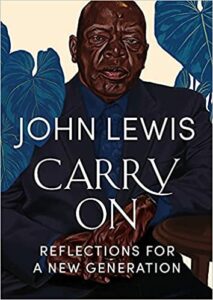 Carry on: Reflections for a New Generation John Lewis (Grand Central Publishing) $22.00 OUR SALE PRICE = $17.60 DUE DATE: JUST ARRIVED! AVAILABLE NOW
Carry on: Reflections for a New Generation John Lewis (Grand Central Publishing) $22.00 OUR SALE PRICE = $17.60 DUE DATE: JUST ARRIVED! AVAILABLE NOW
We are grateful that the great legacy of Congressman John Lewis has been enhanced by the three fabulous graphic novels of his life, the respected trilogy which ends in the award-winning March, which tells and shows the horrible episode on the Pettis Bridge. A forthcoming series of graphic stories by the same artists will pick up where that set leaves off and the first is called Run (we are taking pre-orders for that, too; it releases August 3, 2021.) As you might guess, it tells of the youthful SNCC leader’s call to run for office.
In the meantime, this very handsome, sturdy, hand-sized hardback — brand new today! — offers excerpts of some of Mr. Lewis’s wisdom in bit-sized essays on a variety of topics. Ranging from justice, courage, faith, mentorship, and forgiveness, to the protests and the pandemic, Carry On is part devotional, part manifesto, part commemoration and part civic encouragement, part handbook for meaningful living. What a joy to see his thoughts on mentorship and hope and fear and spirituality. For some reason, I jumped to his one on happiness. It is what Ibram X. Kendi calls a “small guide” but is is clear-headed and honorable. The portrait photo on the back cover will take your breath away.
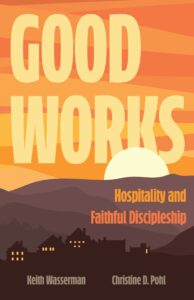 Good Works: Hospitality and Faithful Discipleship Keith Wasserman & Christian Pohl (Eerdmans) $16.99 OUR SALE PRICE = $13.59 DUE DATE: JUST ARRIVED! AVAILABLE NOW
Good Works: Hospitality and Faithful Discipleship Keith Wasserman & Christian Pohl (Eerdmans) $16.99 OUR SALE PRICE = $13.59 DUE DATE: JUST ARRIVED! AVAILABLE NOW
I am happy to say I could hardly put this book down and it exceeded my high expectations for being a book of very helpful and deeply spiritual insight for anyone doing ministry. It is fabulous and I am sure will bless those who care about church life, who serve within organizations, go to work, live in families. Granted, it is written by and about the legendary Southeastern Ohio social service ministry that serve those who are disenfranchised and often without house or home. Yes, it is guided by the very significant author Christian Pohl. Her must-read books on hospitality, community, and service — Making Room, Living into Community, and Friendship at the Margins — are nearly embodied by her former student, Keith Wasserman, and his team in Good Works, Inc. and summarized and clarified in Good Works. If you valued her important books you love this practical application full of stories and inspiration.
This brand new book is a must for anyone who is interested in the great conversation going back to the likes of Samuel Escobar & Rene Padilla, Ron Sider and Amy Sherman, John Perkins and John Stott, about the relationship of social service and evangelism, about bearing Kingdom witness by way of community, missional service, and, yes, pastoral care, spiritual formation and conventional relational evangelism.
You know the assessment (and can predict my next sentences): too many in the evangelical wing of the church have been pushy in their evangelism (and in the world of some “rescue missions” serving those unhoused, they are can even be mean and depersonalizing about it) even as those who have been culturally savvy and justice-seeking about seeking the shalom of the city haven’t always been clear about naming the saving gospel and holding up the name of Christ. The bifurcation continues with some doing verbal evangelism in a way that isn’t particularly attentive to public context or social injustices [with recent books justifying such infidelity these days saying “social justice isn’t Biblical” and asserting that most who seek justice are preaching “another gospel.”) But, yet, some who are doing helpfully wholistic, spiritually-motivated social service still are not winning many to Christ or trying to mentor new Jesus-folk into life-long disciples.) Wasserman’s crew at Good Works In. stands as a wonderful mission proving the caricatures wrong — I haven’t been so excited to learn about a ministry of this sort since we read about Bob and Gracie Ekblad and Tierra Nueva in Burlington, WA.
To be clear, as I suggested in the first paragraph, this book about a wholistic worshipping community that serves the poor and needy is, actually, a story for any of us who want to form organizations and ministries with greater intentionality and concisely Christian processes. From learning to offer gracious hospitality to caring for real persons with stories and gifts and foibles to commitments to Biblically-informed conflict resolution to holding out visionary goals of spiritual formation within their nonprofit, Good Works tells of their journey, their plans, their work, and how it all might offer guidance to all of us. Dear reader, this is not only an edifying story, it is inspirational in the best sense — it will inspire you to be more of what you want to be. It will help you embody Christian grace and honest institutional practices, if you take it to heart.
Good Works is an inspiring and beautiful book full of wisdom. It weaves together Christine Pohl’s decades of insightful scholarship with the practical, lived wisdom of Keith Wasserman and the community of Good Works, Inc. This book helps us all go deeper into Jesus’s call to hospitality and faithful discipleship and to be inspired to live more faithfully ourselves. — L. Gregory Jones, President of Belmont University
Good Works offers a profound paradigm for ministry whereby work with those at the margins is only ‘good’ to the extent that our own character and relationships with God and others are good. Turning the usual metrics upside down with refreshing power, Good Works illuminates the profound difference between ministry and social service agency. — Chris Rice, coauthor, with Emmanuel Katongole, of Reconciling All Things: A Christian Vision for Justice, Peace and Healing
Regardless of one’s ministry context, this book about Good Works, Inc.–a ministry with people struggling against poverty and homelessness–will spiritually challenge yet profoundly reward anyone earnestly seeking to embody Christian hospitality. This account of Keith Wasserman’s forty years of leadership, articulated and arranged by Christine Pohl’s rich and warm theological mind, displays in the most concrete of terms what it takes to truly receive, and be received by, the other as a gift. Only a community rooted in worship and in constant pursuit of relational integrity guided by the Spirit can hope to become a community of friends, not only enduring but flourishing. — Michael Gulker, President of The Colossian Forum
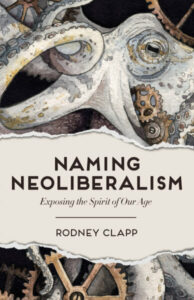 Naming Neoliberalism: Exposing the Spirit of Our Age Rodney Clapp (Fortress) $24.00 OUR SALE PRICE = $19.20 DUE DATE: JULY 20, 2021
Naming Neoliberalism: Exposing the Spirit of Our Age Rodney Clapp (Fortress) $24.00 OUR SALE PRICE = $19.20 DUE DATE: JULY 20, 2021
I cannot say much about this yet as I am just now in the middle of an advanced copy I received. It is due any day now and I can say three things for sure.
First, Rodney Clapp ought to be one of the those authors who you know and buy anything he writes. He was influenced by the late, great Robert Webber — not only in learning about how worship shapes us and the relationship between liturgy and life, but also in his wise and faithful “in the world but not of it” cultural engagement. Do you recall Webber’s lovely take on Niebuhr called The Secular Saint? Rodney has read deeply and lived well in light of a desire to see the worshipping community shape us into counter-cultural “resident aliens.” He has written balanced but provocative books that offer a critique of the secular left and the religious right. (Or, as his vastly under-appreciated Families at the Crossroad put it, “a path beyond traditional and modern options.”) He has written about the church (A Peculiar People), one about the spirituality of the ordinary (Tortured Wonders), a great study of Johnny Cash, and, recently, the fabulous New Creation: A Primer on Living Between the Times which gets us right into the “already but not yet.” Clapp is not only a Texas visionary and fruitful thinker, he is a good writer and has left a lasting mark in the publishing landscape having founded Brazos Press (named, I’m told, after a river in the Bluebonnet State that flows the wrong way) and, later, landed a job as editor at Wipf & Stock. So, firstly: read Rodney Clapp.
Secondly, I know enough at this point about Naming Neoliberalism to suggest that this may be one of the most important books of this sort to be published this year. It is wide-ranging and readable, prophetic and pastoral, if you will, serious but somewhat accesible. This is rare in a book of this sort, to be so expansive, so serious, and yet interesting. It’s extraordinary.
You may know that we are fond of big picture social analysis, cultural criticism, prophetic denunciation of the idols of the time. We do not need many more screeds of the left or right, complaining about Trump or CRT or whatever the bugaboo of the season happens to be from MSNBC or Fox News. We need deeper, radical (as in radix, which means “from the root”) and mature, spiritual insight. You may know I’m fond of the likes of Beyond the Modern Age: An Archaeology of Contemporary Culture by Bob Goudzwaard & Craig Bartholomew (IVP Academic; $35.00) or, more readable, In Search of the Common Good: Christian Fidelity in a Fractured World by Jake Meador (IVP; $23.00.) I even like fiesty authors with a broad-bush thesis like Iain McGilchrist and his The Master and His Emissary: The Divided Brain and the Making of the Western World (Yale University Press; $30.00) and the exceptional interesting and exceptionally relevant The Year of Our Lord 1943: Christian Humanism in an Age of Crisis by Alan Jacobs (Oxford University Press; $31.95.) I can’t tell you how often I recommend Brian Walsh & Steven Bouma-Prediger’s sprawling, epic, Beyond Homelessness: Christian Faith in a Culture of Displacement (Eerdmans; $31.50) which starts with the specificity of working with those on the urban streets of Toronto at a homeless shelter and moves out to a analysis of cultural mobility and disregard for place that is nothing short of brilliant. I splurge with this extravagance name-dropping to offer a frame of reference, tenuous as it may be — Rodney Clapp is as incisive a cultural critic and as bold as a prophet as any of these authors and important books. It’s that big and broad, that useful as social criticism.
If you care about the nature and texture and the direction of our society, Naming… is a must-read. As the publisher plainly explains, “Neoliberalism, a panoply of cultural, political, and economic practices that set marketized competition at the center of social life, is rife in our age. Naming Neoliberalism lays out for pastors, thoughtful laypersons, and students, what neoliberalism is, where it has come from, and how it can be confronted through and in the church.”
When Clapp says in the subtitle of Naming Neoliberalism, though, that it is “Exposing the Spirit of Our Age” he is on to something big. I suspect the marketers dissuaded him from putting on the cover what is in large print on the back: “Exposing the Principalities and Powers.” I suppose I’d be exhibiting my tendency for reviewer’s flamboyance if I said this book may be considered an exorcism (calling David Dark!) But there it is. As Sam Wells says on the back, “Jesus’s kingdom proclamation disarmed the powers and revealed a new, in-breaking reality. Rodney Clapp’s book follows in that exalted tradition.” That is, to be clear, the tradition of proclaiming the Kingdom and of “disarming the powers.”
Thirdly: this really is a guidebook for this perennial question (see Webber’s The Secular Saint, again) of how to be in but not of the world. How do we embody a transforming vision and what does it mean to know something is wrong with our culture but not merely adopt an over-correction of the pendulum swinging from left to right or from right to left? What does it mean to study the past, in light of Biblical and theological sensitive to idols, and offers us a fresh way out of of Babylonian captivity? How then shall we live?
If you sense that something seems wrong with current manifestations of US Christianity, with our economic inequality, and our culture warring, but naming it is not easy then this book is for you. Clapp’s Naming Neoliberalism is the best historical and theological analysis of where we are, how we got here, and what might be done about it, available to us. From a history of enclosures to an examination of slavery, a journey through the Thatcherite and Reagan complete capitulation to neoliberalism, followed by the Clinton willing acquiescence and much more, Clapp traces the history of neoliberalism judiciously, carefully, and with theological insight. This book is a must read. –D. Stephen Long, Professor of Ethics, Southern Methodist University
Rarely are critiques of neoliberalism followed by beautiful, constructive proposals for alternative ways to live. By giving us both, Clapp offers this book as a gift to the church. The converse is also true: it is important not only to identify the life-affirming work churches are called to do but also to help congregations name and understand the dominating power of our age. Only when we are clear about what the gospel frees us from and frees us for, Clapp well argues, may the church be a relevant witness against the power and principality of neoliberalism that opposes God’s reign. — Jennifer M. McBride, author Radical Discipleship: A Liturgical Politics of the Gospel, Professor of theology and ethics, McCormick Theological Seminary
Let’s be honest. As pastor of a politically split church, I am not looking for ways to introduce more politics into congregational life. In an age of tweets and squawking, I thirst for the peace of Christ. But after reading Rodney Clapp’s Naming Neoliberalism, I also see how hungry and lonely I have been, while wandering in this desert of culture wars, for some weight and wisdom from a spiritual tradition that is older, larger and deeper than I am. Somehow, Clapp uses a hot button topic to model how to have a cool Christian conversation, across the aisles of politics or pews. I would gladly introduce this book to my church members, for its sense of perspective but most of all for its contagious hope for a church where God is still speaking louder and more lovingly than the pundits. –Lillian Daniel, senior pastor of First Congregational Church of Dubuque, Iowa and author of Tired of Apologizing for a Church I Don’t Belong to.
 Tear Down These Walls: Following Jesus into Deeper Unity John H. Armstrong (Cascade) $23.00 OUR SALE PRICE = $18.40 DUE DATE: AUGUST 1, 2021
Tear Down These Walls: Following Jesus into Deeper Unity John H. Armstrong (Cascade) $23.00 OUR SALE PRICE = $18.40 DUE DATE: AUGUST 1, 2021
I have not done as good of a job as I wished I would have of promoting a previous book of my friend John Armstrong, but I will admit — pushing a book called Your Church Is Too Small was hard. Especially since it was decidedly not about church growth or dissing small congregations: it would have been more prosaic, but it should have been called “Your View of the Church Is Too Small: Why Being More Ecumenical and Inclusive is Biblically Faithful and a Vital Part of Your Christian Discipleship and Our Mission in the World.” Or something like that.
I’ve told a bit of John’s story before, so you may recall that he was a pretty conservative, sectarianly Reformed revival preacher who cited great Puritans and fretted about the purity of the evangelical subculture. He was (and remains) a great communicator and fine preacher and he still longs to honor God by exalting Christ and his saving power. But yet, unlike most church leaders, he takes seriously the great prayer of Jesus Himself (John 17) about unity within the Body of Christ. Indeed, no lesser a Reformed, respected evangelical voice than J.I. Packer decisively set John on a path toward this calling (in the second half of his life) to be an agent of missional ecumenism.
His book Costly Love: The Way to True Unity for All the Followers of Jesus came out in 2017 (intentionally published by a Roman Catholic publisher) and explored the sort of Bible-based, gospel-centered, Sprit-given love that is needed if we are going to manifest the sorts of trans-denominational, ecumenical vision that he insists God desires. It is a great book, a rare work on love. I wish it were better known among us and remains a thoughtful, even profound read.
This long awaiting new rumination on discipleship, mission, and Christ’s call to unity, Tear Down These Walls, is largely drawn from and inspired by the less than best-seller status of the very fine Your Church Is Too Small. That is, it is absolutely not a reprint of that earlier work, although some of the material in that book has found its way in fresh reformulation in this new title. If you were one of the few who purchased that earlier great book you will surely love this one that expands that one with lots of new content, lots of new stories, lots of new insight, lots of new passion; it is more than updated but a fully new treatment. If did not read Your Church Is Too Small then you simply must consider Tear Down These Walls. It is a book full of gospel urgency, Biblical wisdom, and visionary in a way that will be sure to bless you. It is something, as you know, that means a lot to us and we are glad for this “best in class” sort of study.
No matter if you are a conservative evangelical, progressive nondenominational, Black or Latine or Asian, mainline Protestant, Anabaptist or Anglican, Roman Catholic or Eastern Orthodox (or even a Mercersberger!) John knows something about your tradition, your insights, your concerns, your foibles. And you need this book, not only to learn about the Biblical mandate to work for unity, but to understand your own place in God’s choir. Of course, he is not striving for some giant One Big Denomination — duh — but he does inspire us to know the other believers in our own towns, to read widely, to draw on the best insights and gifts of Jesus folk unlike our selves, to long for more coherent worship, shaped by a beautiful orthodoxy. Rev. Armstrong is pleasant and wonderfully curious about so much (I happen to know some of the books he reads and, well, talk about what they call a voracious reader!) Such wide reading makes for good writing, and he has a lot on his heart to share.
You will be, as I have been, immediately engaged by Armstrong’s vivid description of Ronald Reagan’s bold and now historic call to Mikhail Gorbachev to “tear down these walls” in the early pages of the new book. As you can guess, it becomes a metaphor for the work we must do if Christ’s church is to illustrate some of the unity He calls us to.
As my friend Alexei Laushkin, of Kingdom Mission Society, put it,
Reflecting on a lifetime call for Christian unity, Tear Down These Walls is a must-read for anyone who has a ministry call of healing wounds in the body of Christ. This work invites us into the life-giving relationships made possible by a Christ who calls every part of his church to follow him more closely, and in that process to love their fellow Christians more deeply.
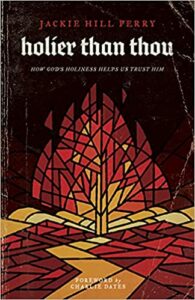 Holier Than Thou: How God’s Holiness Helps Us Trust Him Jackie Hill Perry (B+H) $17.99 OUR SALE PRICE = $14.39 DUE DATE: AUGUST 1, 2021
Holier Than Thou: How God’s Holiness Helps Us Trust Him Jackie Hill Perry (B+H) $17.99 OUR SALE PRICE = $14.39 DUE DATE: AUGUST 1, 2021
We are happy to highlight this forthcoming book by the very popular, very thoughtful, black evangelical thinker and speaker and artful author. We have been with Jackie a time or two backstage at an event where she was speaking; I didn’t disturb her because I sensed she was intensely intent on communing with God as she prepared to go on stage. Funny, some big name speakers are all prayerful and quiet before going on but many are chatty and casual. Before my book announcements sometimes I can be both, but I notice when a person has some discernment about the necessary spiritual preparation before doing a major talk and I admire their appropriate devotion. Jackie Hill Perry seems to be one of these impressive, Godly women who takes her call to speak and write with utmost seriousness.
Her first book was a memoir of her life, published in 2018 by B+H, the Southern Baptist publisher, called Gay Girl, Good God: The Story of Who I Was, and Who God Has Always Been which obviously included the telling of her struggle with what she calls same-sex attraction (giving a clue that she is fully Side B in that conversation and is sure that her disposition is sinfully disordered.) Agree or not, it is one of those memoirs of a young person coming up with great complexities — not just sexual identity — and finding a sustaining power in the grace of the gospel. The subtitle is important, too — Ms Perry, even in that first memoir wants to talk about God’s power and grace more than her own struggles. Not all readers have found this to be as gracious and helpful as some do, but it is a story many conventional evangelicals find helpful.
This new one (which we will have shortly) is not about sexual identity, or at least not much. It is, as the title shows, about the nature of God. In this sense it picks up on themes that have been on her heart for a while — God’s magnificence, wonder, glory, moral perfection. I do not think she intends to put any political ideology around this; it is a vital aspect of God’s self revelation in Scripture and a standard topic within theology. To have a black woman poet writing about this hefty, heady topic is going to be good.
In fact, listen to urban pastor Dr. Eric Mason (of Epiphany Fellowship Church in Philadelphia) who writes about Jackie and her new book:
Art and theology have met. Many times reading theology can feel so impersonal that many people view it as irrelevant. However, when art and theology meet, we get the Psalms, Parables, Prophets, and more. I’m glad that this generational voice is a symphonic blend of the sorts. Holier Than Thou is a must read. Many in this generation and beyond may find this work as a gateway into theology and more importantly to understanding the holiness of God and their call to reflect it in and through Jesus Christ. —Eric Mason, author of Urban Apologetics: Restoring Black Dignity with the Gospel
And, of course, Jen Wilkin is a solid, conservative Bible teacher whose books we regularly promote. She says:
In a world consumed with self-discovery, self-absorption, and self-worship, the people of God need regular reminders to lift our eyes to a higher Object than this earthly plane can offer. Jackie brings to bear her prodigious gift with words on the Bible’s message of God’s transcendent holiness. She offers us not just a God worthy of our worship, but of our complete trust and obedience. –Jen Wilkin, author of In His Image: 10 Ways God Calls Us to Reflect His Character and None Like Him: 10 Ways God Is Different from Us
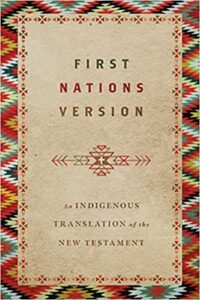 First Nations Version: An Indigenous Translation of the New Testament Terry M. Wildman, lead translator, Editor, project manager (IVP) hardback, $35.00 // paperback, $20.00, OUR SALE PRICES = $28.00 (hardback)//$20.0 (paperback) DUE DATE: AUGUST 3, 2021
First Nations Version: An Indigenous Translation of the New Testament Terry M. Wildman, lead translator, Editor, project manager (IVP) hardback, $35.00 // paperback, $20.00, OUR SALE PRICES = $28.00 (hardback)//$20.0 (paperback) DUE DATE: AUGUST 3, 2021
I have not seen this yet and know nothing except that it is going to be highly acclaimed, much-discussed, widely used and will (perhaps like the first time you read The Message) be a joyful, maybe even fun, reading experience. It is not a paraphrase like The Message, but is an actual translation project using the “dynamic equivalence” approach (that shapes most modern translations, actually.) Done by a team of Native North American Bible and linguistic scholars from over twenty-five tribes, the FNV is nothing short of groundbreaking. We should tout it as a publishing event!
The publisher writes that The First Nations Version (FNV) recounts the Creator’s Story — the Christian Scriptures — following the tradition of Native storytellers’ oral cultures. While remaining faithful to the original language of the New Testament, the FNV is a dynamic equivalence translation that captures the simplicity, clarity, and beauty of Native storytellers in English.
I’m sure you know something about the complexities of Bible translations — sometimes the original ancient Hebrew, Greek, or Aramaic words carry notions or ideas that cannot be simply put in the contemporary language into which it is being translated. Scholars all over the world argue about how best to translate this ancient word into Pashto or Swahili, Yupic or Mandarin, French Canadian or Arabic. The point being that it isn’t a simple word-for-word world we live in and worldviews and cultural assumptions and social customs shape the linguistic forms and languages of people groups. And even as those people adopt another language — most indigenous or First Nation Americans speak English, of course —their idioms and traditions of storytelling and motifs of communication remain.
As the FNV team put it, “Many first Nations tribes communicate with the cultural and linguistic through patterns found in their original tongues. This way of speaking, with its simple yet profound beauty and rich cultural idioms, still resonates in the hearts of First Nations people.
From the beginning, the story of Jesus has been a translated story. Jesus spoke in Aramaic, but Matthew, Mark, Luke, and John wrote their Gospels in Greek. The story of Jesus is intended to be translated to every tribe, tongue, people, and nation. That translation is intended, not just permitted, serves to show how we must resist any cultural domination of the gospel. Terry Wildman has done a masterful job of rendering the New Testament into the storytelling motif characteristic of Native Americans. It should tell us something important when we realize how beautifully the story of Jesus can be adapted to the style and vocabulary of indigenous people. I deeply appreciate Terry Wildman’s retelling of the story of Jesus for First Nations people. I believe the Great Spirit is pleased. –Brian Zahnd, pastor of Word of Life Church in St. Joseph, Missouri, author of Beauty Will Save the World
Reading the First Nations Version of the New Testament is like listening to a wise elder pass down ancient teachings. Its oral cadences give the Scriptures new room to breathe. While contemporary translations focus on updating language in a modern mode, the FNV recaptures the sense of tradition that binds faithful readers to our past and to the story that tells us who we are. It is a good gift to everyone who walks the Jesus Way. –L. Daniel Hawk, professor of Old Testament and Hebrew, Ashland Theological Seminary
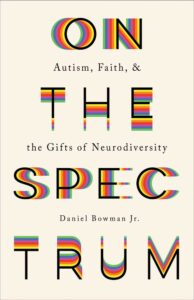 On the Spectrum: Autism, Faith, and the Gifts of Neurodiversity Daniel Bowman, Jr. (Brazos Press) $19.99 OUR SALE PRICE = $15.99 DUE DATE: AUGUST 10, 2021
On the Spectrum: Autism, Faith, and the Gifts of Neurodiversity Daniel Bowman, Jr. (Brazos Press) $19.99 OUR SALE PRICE = $15.99 DUE DATE: AUGUST 10, 2021
I was captivated by the first page, hooked on the entire, long prologue, and am now a huge fan of this amazing, splendid book. I enthusiastically recommend it for a number of important reasons. I wish I had more space to give it the thorough review it certainly deserves. I hope you order a few copies to share!
Daniel Bowman, you should know, is an English prof and poet, working at well-respected Christian college. (We have seen the beautiful literary journal he and his students created, Ruminate.) He’s a classy, thoughtful, widely-read literature scholar and, happily, also a very good writer himself. (His brief description of the main metaphor behind his poetry volume, A Plum Tree in Leatherstocking Country is itself remarkable and will be helpful for anyone who has felt different growing up.) Bowman’s voice is clear and solid, yet artful and lovely. He has a lot to say, a lot to help us see. There has been much pain and anguish in coming to terms with his diagnosis as an adult who is on the autism spectrum and this book feels like a gift, a life-saving gift.
Interestingly, Bowman tells much about how he didn’t know what was wrong with him in his younger life. Well loved and respected he still battled inner demons and his small compulsions, his routine experiences of being uncomfortable, the episodes of blatant oddness, the panic attacks and occasional harsh outbursts caused hurt to those around him. A story of his wife leaving him for a short while was anguishing and brave of him to share. That he experienced depression and suicidal ideation is heart-rending and, again, a gift of honesty that he does not hold from us. Professor Bowman’s reading, reading, reading about the autism spectrum and having the lights finally come on — why didn’t I see this before? — was stirring; painful, but stirring.The first twenty pages of this book are so good you will never forget them.
After this beautiful, clear telling of his experience and discoveries, he does, briefly, two very important things, gifting contributions to your awareness that are worth the price of the book. First, he clarifies the difference between a model of what we might call neurodiversity versus the model of pathology. Like others holding up the inherent dignity of those with specific disabilities, he does not appreciate the insinuation that this is a disease to be cured of — not that there is any such “cure.” (He explains that the ABC approach is not helpful and will soon be discredited like the reparative therapy approach that made false and hurtful promises about altering the sexual attractions of gays and lesbians.) His brief debunking of myths about autism is urgent. As Katherine May (author of the beautifully rendered Wintering: The Power of Rest and Retreat in Difficult Times) says,
On the Spectrum rings with poetry, compassion, and wisdom, and it reveals so much about autistic experience. I felt nourished by the truths that Bowman tells and relieved to see them shared. This book may surprise you, and it will certainly inform you.
The second thing Bowman does briefly early on in this book is explain that many books about autism are of two sorts: there are clinical kinds of books about helping and coping, mostly written by (neurotypical) medical or psychology experts and mostly aimed at parents. Or, there are memoirs, most of which are written, interestingly, by those who are not on the spectrum themselves. He preaches just a bit about how wrong this is — don’t write about us without us, as they say. Who knew that there were, actually, not that many memoirs by adults who are neurodiverse themselves?
On the Spectrum has a small section on “how to read this book” in which he shows how some of the format and style and quirks in the writing and stylings are themselves illustrative of how a writer (at least this writer) with autism writes about things. It was a good heads up to alert neurotypical readers to put on their seat belts and reserve judgement.
As it ends up, it seemed to me that this book is not that unusually quirky although it is artful and creative. He is a poet after all and has been an advocate for deepening the Christian conversation about faith and the arts. On the Spectrum includes essays and well written blog posts and creative report of his life and interests and passions. He calls it “a memoir in essays” pointing out that the original meaning of the word “essay” means to explore. Indeed. This is an invitation to explore and you should take him up on the offer, You won’t regret it, and the world will be a better place if more of us read this lovely, helpful book. Bowman himself holds out these hopes as he says he writes, in part, to help us all learn to love our neighbors better. Indeed.
“This is an illuminating, challenging, and deeply human book that we all need to read in order to truly embody solidarity. We need to read stories of neurodiversity from those who embody those stories best, and Bowman’s book is a great place to start the journey.” — Kaitlin B. Curtice, author of Native
“I can only imagine how many people will read Bowman’s moving memoir and feel like someone finally sees them. But for neurotypical readers like me, Bowman invites us to see our neighbors afresh. This book itself is one of the gifts of neurodivergence, adding to this teeming, diverse creation in which God takes delight.” — James K. A. Smith, professor, Calvin University; editor of Image Journal; author of On the Road with Saint Augustine
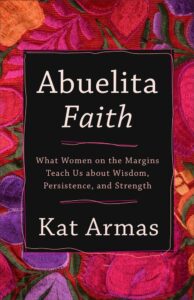 Abuelita Faith: What Women on the Margins Teach Us about Wisdom, Persistence, and Strength Kat Armas (Brazos Press) $17.99 OUR SALE PRICE = $14.39 DUE DATE: AUGUST 10, 2021
Abuelita Faith: What Women on the Margins Teach Us about Wisdom, Persistence, and Strength Kat Armas (Brazos Press) $17.99 OUR SALE PRICE = $14.39 DUE DATE: AUGUST 10, 2021
We here at Hearts & Minds were honored to get an early galley of this and we are thrilled to say that it is a great, great read. There are a number of radical theological writers that bring their ethnic social location to the very task of doing their spiritual scholarship. There are Latinex Bible interpreters and Asian (and Asian-American) theologians and black thinkers of all sorts, from Esau McCaulley (and his excellent Reading While Black) and scholars as diverse as James Cone and Vonnie Bacham. There are womanist theologians like Delores Williams and the essential Katie Cannon. And, by Latina women, there’s mujerista theology.
I am always on the look-out, though, for academic scholars who are not writing primarily for the scholarly guild and who do not draw on heady philosophers (and critical race theory, say) in such detail that ordinary people are lost reading their stuff. We are always on the lookout for that sweet-spot of a narrative of how a person — in this case, a person of color — narrates her work and tells and shows just how it’s done with some (but not too much) academic cred. And at this, in Abuelita Faith, Kat Armas is my new hero.
She does what is exceedingly rare in this too often rarefied world of critical thinking about hermeneutics, social location, decolonization, ethnic and class and gender biases and such — she tells her story (and about learning proverbs, called “refrains”, from her abuelita) — and shows how as a second generation Cuban-American (displaced and exiled) she approaches her love of God, God’s Word, and the theological vision that emerges from that mezcal of Caribbean roots and women’s experience in hot, hot Miami. She notes that radical theologian and activist scholar Miguel De La Torre uses the term ajiaco, which is a Cuban stew, a spicy, indigenous and tasty metaphor. That works for Armas’s book, too.
Abuelita Faith: What Women on the Margins is mostly about women of the Bible but also about how those women can inspire us today. In this regard it is not unlike Hermanas: Deepening our Identity and Growing Our Influence by Natalia Rivera, Noemi Vega Quinones & Kristy Garza Robinson (IVP; $17.00), which, again, holds up marginalized women in the Bible as exemplars. However, as I’ve noted, it is also about the women in the life of Kat Armas, mothers and grandmothers aunties and sisters, all who conveyed wisdom and shaped her sense of identity and gave her courage growing up. These often uneducated women had a natural sense of how to subvert the colonial images and forces over their lives. And they stuck together, passing wisdom on in creative ways.
Those of us in mostly white, middle-class suburbia, I sometimes find, are not strongly rooted in a particular community, a thick network (let alone a heritage) of extended wise elders and supportive loved ones. (Indeed, this is one of the reasons for the popularity of Uprooted: Recovering the Legacy of the Places We’ve Left Behind by Grace Olmstead (Sentinel; $27.00) which has been popular after our review a while back.) Ms. Armas and her story has much to commend to us as we have the privilege of watching over her shoulder as she teaches “wisdom, persistence, and strength” from the Bible characters she loves as taught to her, in many way, by her Latina community.
The advanced buzz on this has been healthy and enthusiastic and we’re excited to get it in soon. She tells her story, knows her theological stuff (and draws on diverse and multi-ethnic resources, from Cesar Chavez (God bless her!) to Howard Thurman to Amy-Jill Levine. Check out these lovely endorsements:
“Armas reminds us that theology can be lived, not just theorized by those with the most social power, and that it’s happening precisely in the places where we have been told not to look.” — Hillary L. McBride, psychologist, speaker, podcaster, author of the forthcoming The Wisdom of Your Body: Finding Healing, Wholeness, and Connection Through Embodied Living
“Armas demonstrates that powerful named and unnamed women, who through the quotidian have affected the outcome of history, fill not only the Bible but also our lives. Let us sit at Armas’s feet that we might gain the wisdom we so desperately need to embody abuelita faith ourselves. — Marlena Graves, author of The Way Up Is Down: Becoming Yourself by Forgetting Yourself
“A tour de force. Armas immediately and boldly draws us into her abuela’s magnetic and wise Cuban embrace while opening up an intimate universe of courageous, faith-filled women inside the biblical narrative and beyond.” — Mark Labberton, president, Fuller Theological Seminary
“Armas invites us to the space of the margins–a space full of struggle, failure, bodies, beauty, and the humanity we all desire to see and embrace. This journey will shake us, put us back together again, and make us free.” — Dante Stewart, writer and speaker, author of the forthcoming Shoutin’ in the Fire: An American Epistle
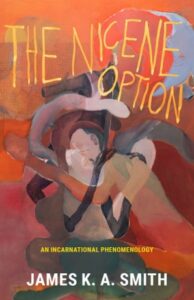 The Nicene Option: An Incarnational Phenomenology James K. A. Smith (Baylor University Press) $39.99 OUR SALE PRICE = $31.99 DUE DATE: AUGUST 15, 2021
The Nicene Option: An Incarnational Phenomenology James K. A. Smith (Baylor University Press) $39.99 OUR SALE PRICE = $31.99 DUE DATE: AUGUST 15, 2021
This forthcoming text will be for many of our readers a no-brainer to order — it’s the new Jamie Smith, who is one of the most important writers today. You’ve read his early books on postmodernism, you’ve appreciated his thoughtful introduction to the dense work of Charles Taylor and the secular age, you’ve devoured his collection of short essays in volumes like Discipleship in the Present Tense: Reflections on Faith and Culture and 2009’s fine collection The Devil Reads Derrida and Other Essays on the University, the Church, Politics, and the Arts. You’ve hopefully enjoyed his marvelous, exceptionally wise “Real-World Spirituality for Restless Hearts” called On the Road with Saint Augustine. Maybe you’ve read his edited volumes on science or education. Maybe you even subscribe to the very classy arts journal he edits, Image. Most famously, you know his You Are What You Love and if you’re a real fan, or allowed us to harangue you into it, you’ve got the full trilogy (maybe even the nice boxed set) of Desiring the Kingdom, Imagining the Kingdom, and Awaiting the King. A new collection of philosophical essays about continental philosophy? Sure, you may not really know what that even is, but hey. You’re in.
Good for you! I myself am currently reading an advanced review version of this and even though it is above my pay grade, Smith is always a good, good teacher and this is, I believe, important stuff. If you care about his work and his overall projects (from You Are What You Love to the phenomenology of worship to his interest in the Radical Orthodoxy movement; from his several essays on Christian politics to his recent work in aesthetics as editor of Image Journal) you will want to learn what is behind it all.
And this; this is some of what it is behind it.
Smith has his PhD in philosophy, after all — he studied at the Institute for Christian Studies, the Dooyeweerdian-ish grad school in Toronto, filled with Christianly subversive neo-Calvinist intellectuals and then under deconstructionist John Caputo at the (Catholic) Villanova University. He has numerous academic tomes, monographs, expensive hardbacks from the scholarly presses (and we stock many of them, including the fabulous Thinking in Tongues: Pentecostal Contributions to Christian Philosophy which is wonderful and still in print from Eerdmans.) I sometimes say that the best Smith book to introduce people to his own philosophical work — a book whose themes show up in other recent work, including this new forthcoming one — is the exceptionally valuable The Fall of Interpretation: Philosophical Foundations for a Creational Hermeneutic in its second edition from BakerAcademic. It’s a gem and I think is important to fully appreciate his any other books.
HEY: After writing the above paragraphs, I jumped over to the Baylor University Press webpage and found this promo bit about the book. See? I’m not making this stuff up — even they want to market this to thoughtful, general readers who want to know more of why Smith is up to the many interesting things he is:
Besides issuing a clarion call for the renaissance of continental philosophy of religion, The Nicene Option also offers a glimpse behind the scholarly curtain for a wider audience of readers familiar with Smith’s popular works such as Who’s Afraid of Postmodernism?, Desiring the Kingdom, Imagining the Kingdom, and You Are What You Love—all of which are tacitly informed by the phenomenological approach articulated in this book. As an extended footnote to those works—which for many readers have been gateways to philosophy— The Nicene Option presents an invitation to a new depth of reflection.
I know that this book is a bit salty with its university press price tag (although Baylor does manufacture very well crafted books) and I know some of the chapters about European philosophers are going to be slow-going, but his introduction is nothing short of brilliant in a clear-headed, teacherly way.
Although most of these chapters were previously published in academic journals or as chapters in random books here and there, the long introduction is up to date and new, framing Smith’s life’s work on these themes with a fabulous, fresh overview. It is really very interesting.
Smith cleverly (and helpfully) calls it “God on the Left Bank?” and asks about the prospects for a Continental (which, mostly means, in short-hand, postmodern) philosophy in the field of the philosophy of religion. You see, up until a few decades ago this field was dominated by the exceedingly secularizing, “reductionistic” lights of modern/Enlightenment rationalists. An odd shift in US philosophy happened in the later part of the 20th century when extraordinary, respected, world-class Christian philosophers like Alvin Plantinga and Nicholas Wolterstorff took up major positions in the journals and conferences and associations of American philosophers, arguing for a “warranted” Christian belief and “reason without the bounds of religion.” But, still, the US was largely analytic, even (without irony) in the study of religion.
Study in Europe (“the Continental” approach) was mostly phenomenological. That is, I might say, post-Kantian, for those keeping a big picture chart. He explains it very well although in my simple lingo I suggest such philosophy is akin to existentialism. (You remember Camus and Sartre from college, or Francis Schaeffer, at least, right?) Smith mentions what some call the “German turn” which was when French thinkers took up Heidegger and we ended up with Derrida and Baudrillard but also with Merleau-Ponty and Jean-Luc Marion and Levinas. Gadamer is important here, too, although he grew up in Poland. Marion, especially, is a thinker Smith finds generative and he interacts with his work significantly.
If you have followed Smith in You Are What You Love and the multitude of footnotes in Desiring the Kingdom and Imagining the Kingdom you’ll be interested to see how he here exposes secular liturgies in the field of the study of religion. (In fact, he observes, liturgy and worship and Christian practices are not studied at all in the philosophy or religion; they seem interested in “belief but not believers”, as if religion can merely be reduced to its most abstract ideas, disembodied. To remedy this he calls for a messy/embodied “post-secular study of religion” and it is beautiful to see a thoughtful philosopher making this reforming move to contribute to his particular field.
(As I sometimes say about great books in specific disciplines, it is just a joy and wonder and privilege, and somehow instructional and thereby inspirational, to watch a good Christian thinker integrating faith into his or her field, to talk well about their craft or their uniquely Christian practices that shape their own work, whatever it is. This is how I feel about Smith — what a witness it is to see somebody who has studied his field so well and has something insightful and wise, perhaps controversial and maybe even deeply and faithfully Christian to say and says it in a way that others in the field can easily acknowledge it as plausible and good and beautiful, even. By the way, Jamie does this, too, in a plainspoken set of “prescriptions for a healthy sub discipline” in which he makes some proposals for how this field ought to engage in dialogue within its journals and conferences. Fascinating.)
It is fair to say that you may not want to read all of these serious chapters, in order, chapter by chapter. I am skipping around in the second half although the first four after the great introduction kept me busy as I worked on every page and every footnote straight through. Smith, you might know, is fabulous as a footnoter with great little asides and comments. He’ll say stuff like, “which so and so covered supremely in such a such a book” or “as you can see in her sixth chapter of her second book which is the best thing on the subject” etc. etc. So good!
Some of the second half gets really thick although, again, some are drawn from other books or previous journals — he even notes at some point as an aside how said he feels re-working this stuff as Derrida, say, was alive when he had written the chapter about him. It’s a different time, now. Still, even with chapters on “Re-Kanting Postmoderns?” and “Determined Violence” in Derrida and “Beyond Epistemology: Derrida and the Limits of the Limits of Knowledge” there is enough even for non-philosophers to appreciate. I loved a chapter called “Determined Hope: A Phenomenology of Christian Expectation”although I’m going to use my “call a friend” option to appreciate “the principle of incarnation in Derrida’s, uh, a big German word I can’t pronounce. Equally dense, but rewarding for some of us, are chapters on “Deconstruction–an Augustinian Science?” (You know the answer!) And the deep but moving “Picturing Revelation: Idolatry and the Aesthetic in Marion and Rosenzweig” which I loved and found oddly stirring, even though I had no idea who the Jewish scholar Rosenzweig was.
The last chapter I had read before in another wonderful volume edited by Smith called The Hermeneutics of Charity — “The Call as Gift: The Subject’s Donation in Marion and Levinas.” It, too, is an example of Smith’s long-standing reformational vision, taking up an “incarnational phenomenology.” As one of the chapters that is drawn from a book about him, there is, a “Logic of Incarnation.” Indeed, this is why he calls it “The Nicene Option.” And as Peter Ochs of University of Virginia notes, “Only James K. A. Smith could do it.”
Please read this accolade about the book and about the gift Smith illustrates in this studious sort of work:
The intellectual labor of translating big ideas–and thereby being accountable to them–involves a special form of rigor and originality. James K. A. Smith is in the middle of a career showing how beautiful, and beautifully impactful, such work can be. This book serves at once as field-notes to that translational work and as another brilliant contribution to it. The conceptual payoff comes in how the book’s own big idea about embodiment demonstrates why good translation matters. –Jonathan Tran, Professor of Philosophical Theology, Baylor University
A quick final comment: The Nicene Option is dedicated to a delightfully Christian philosophy, Merold Westphal, who has long been an encouragement to Jamie in his work as a Christian scholar and professor. Westphal is largely known as a (Mennonite) Kierkegaard scholar. The tribute is well deserved and quite lovely.
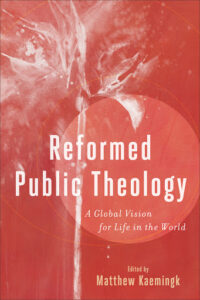 Reformed Public Theology: A Global Vision for Life in the World Matthew Kaemingk (Baker Academic) $29.99 OUR SALE PRICE = $23.99 DUE DATE: AUGUST 17, 2021
Reformed Public Theology: A Global Vision for Life in the World Matthew Kaemingk (Baker Academic) $29.99 OUR SALE PRICE = $23.99 DUE DATE: AUGUST 17, 2021
This is, again, one of those books that I wish I could describe in a full-on major review. One gets one’s money’s worth on this as there is so much in this collection and I wish I could describe each of the many chapters. Yes, I’ve already read almost all of them (including, or, at least, the footnotes) because, well, that’s how I roll with this neo-Calvinism of contemporary Kuyperians. I’ve been waiting for decades for a fresh and serious collection like this which knowingly applies the Kuyperian model of the Lordship of Christ over “every square inch” of a good creation gone bad (but which is being transformed and redeemed and restored by the Risen One and His missional people.) A book that shows the breadth and scope of Christ’s redeeming work and our multi-dimensional call to think well about all spheres of life with a vision that isn’t trying to “take over” or win the culture wars but that is pluralistic and cares deeply about justice for the common good. Yep, all that is shorthand that I often use to allude to the Kuyper tradition of (“in the line of” as the Dutch say) Holland’s early 19th century prime mover who became Prime Minister and is exactly what Kaemingk (himself one of the young rising stars of this movement) has naturally baked into the scholarship of this remarkable collection. There hasn’t been a great big book like this within the reformational tradition for a very long while.
And, happily, it does update the Neo-Calvinistic lingo a bit — not just offering citations from arcane Dutch philosophers (like Dooyeweerd, say) and older Dutch theologians (like Bavinck, say) — by using the current language of “public” theology. This is really helpful, and there is a good bit in the opening about what is meant by (and, of course, the history of) the phrase “public theology” itself.
Actually, though, Dooyeweerd’s and maybe Kuyper’s strictest followers would cry foul — conscientious Reformed scholars writing about the aesthetics of fashion (as Robert Covolo does) or work (as Katherine Leary Alsdorf does) or about political activism (as Stephanie Summers does) or how to think about what poetry is and does (as James K.A. Smith does) are not, in fact, theologians or, technically, doing theology, as such. But yet, these scholars are informed by great theology and (my hunch is that they most likely know more bone fide theology than your typical church pastor.) These extraordinary global scholars apply theological ideas and insights to their given field, be it the study of “modern political ideologies” (by Bruce Riley Ashford & Dennis Green channeling David Koyzis) or critical race theory (which Jeff Liou handles adroitly) or the great chapter by Presbyterian Eric O. Jacobsen, “Streets of Shalom: Reformed Reflections on Urban Design.”
Yes, this is theological, but it is “public theology” and in most cases, very public in scope as the chapters examine (and offer Christian insights about) workers rights in China (Agnes Chin) and Japanese aesthetics (Makoto Fujimura) or questions about navigating political pluralism (by way of a great case study in Indonesia by N. Gray Sutanto) and a great piece about engaging pluralism on modern (postmodern?) college campuses by Veritas Forum spokeswoman, the fabulous Bethany Jenkins.
From the study of populism to the ethics of euthanasia to a chapter about the sorts of prayerful piety needed for those in public life (a truly fantastic piece by Jessica Joustra) this work in Reformed Public Theology is vivid, if scholarly, and very much about the issues of the day, concerns and topics about which we should know a bit, at least.
Naturally, there is also rigorous wisdom about the church itself. Editor Matt Kaemingk, you know, did that stunning book called Work and Worship so he is deeply interested in how the local church can shape and motivate congregants for taking up this project of shaping and living out a coherent, healthy public theology. There are chapters such as a great one by Kyle Bennett on confession as a practice for civil public discourse; there is a must-read chapter called “A Migrant at the Lord’s Table: A Reformed Theology of Home” by Alberto La Rosa Rojas; the great John Witvliet (of the Calvin Institute of Christian Worship) has a much-needed piece called “Public Trauma and Public Prayer: Reformed Reflections on Intercession.” Nico Koopman has one that is equally vital called “Sexism, Racism, and the Practice of Baptism in South Africa: A Reformed and Transformative Perspective.”
If you are like those who buy most religious books — popular devotional literature and even theological work — who may ask, as they did of the famous Butch Cassidy and the Sundance Kid, who are those guys? Indeed, where does this rich legacy of scholarly work with practical application come from?
The answer is, as we have said, for this particular volume, the tradition of Dutch Calvinism that draws on Abraham Kuyper and his founding of the Vrije (Free) University of Amsterdam that, in its heyday, was tasked with “thinking Christian” about all the arts and sciences in order to do Christian scholarship to the glory of God but also for the common good. Kuyper wrote much about a theology of culture and offered many theologically potent themes to help us navigate the currents of modern culture. This is the sort of Reformed tradition in its broad scope and public witness that this book stands within.
But more immediately, the book comes from the work of Richard Mouw, former President of Fuller Theological Seminary. Mouw, as I hope you know, is beautifully shaped by this particular strain of evangelical thought (and he even cites us and describes our bookstore about this very thing in his latest paperback, All That God Cares About: Common Grace and Divine Delight which I think is swell.)
After Mouw’s retirement from Fuller he undertook a rigorous program of mentoring PhD candidates who wanted to integrate this worldviewish, gracious, public theology and their particular field of interest. Many of these chapters (although not all — Nicholas Wolterstorff was not a student of Mouw’s, just for instance) are delightful adaptations of PhD thesis’s done under Mouw’s supervision. Yes, this book is what they call a festschrift, a collection of essays to honor a mentor or scholarly colleague as he or she retires. I have rarely seen a festschrift so well done, so exciting, so applicable. And, like Mouw and his global interests, many of these contributors are themselves writing about their application of this vision of public theology to their own context in Africa or Asia or South America or Europe. Whether you know Mouw or not (whether you are even Presbyterian or Reformed or not) Reformed Public Theology is a fabulous (multi-ethnic and global) anthology of some of the very best intentional Christian thinking about specific topics within several various spheres of life that has been published in years.
As Mr. Kaemingk says in the excellent foreword, there are many parts of the world that are under-represented here and there are many topics that are not covered. Admittedly. So, all I can say is that we hope many people buy this one showing the editor and publisher that there is a demand for this rigorous public theology and that — please! — there could soon be a part two. For now, though, relish the joy of learning and buy yourself a copy of Reformed Public Theology : A Global Vision for Life in the World. We thank you for caring.
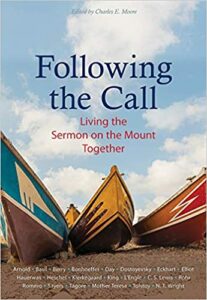 Following the Call: Living the Sermon on the Mount Together edited by Charles E. Moore (Plough Publishing) $18.00 OUR SALE PRICE = $14.40 DUE DATE: SEPTEMBER 7, 2021
Following the Call: Living the Sermon on the Mount Together edited by Charles E. Moore (Plough Publishing) $18.00 OUR SALE PRICE = $14.40 DUE DATE: SEPTEMBER 7, 2021
Although our Neo-Calvinistic tradition, represented by the above-mentioned book edited by Matthew Kaemingk (Reforming Public Theology, done in honor of Richard Mouw) is global and covers much territory, it is, knowingly, within a certain, specific, theological tributary of the Reformation. Most of the authors of that collection are themselves fairly ecumenical, but this book — another that we are simply overjoyed to tell you about — is the most delightfully curated, fully inter-denominational book we’ve seen in a long time.
Plough, the publisher, is rooted in the radical Anabaptist tradition of the Bruderhof communities (somewhat akin to the Hutterites, who are somewhat akin to the Amish) but yet they draw on the most diverse range of authors of any religious publisher of which we know. We happily stock nearly all of the Plough Publishing volumes and respect them for their charm and seriousness. This lovely and challenging collection of short readings on Jesus’s Sermon on the Mount is no different and is a beautiful illustration of the grand and broad thinking Plough is known for.
Beautiful and challenging? Yes, indeed. Ecumenical and faithful? Certainly, so. The editor, Charles Moore, is himself a wide-ranging and deliciously curious reader and writer and this volume, Following the Call, is somewhat of a sequel to his previous anthology, Called to Community: The Life Jesus Wants for His People, which was also laden with diverse authors from across the faith spectrum. Like that one, this new one, Following the Call, includes excerpts from the likes of Dorothy Day and John Perkins, Basil the Great and Madeline L’Engle, Richard Rohr and C. S. Lewis. We weren’t surprised to fine a brief piece by Rabindranath Tagor (on grief) but have to admit to smiling when I saw the bit by Francis Chan. From Dorothy Sayers of the mid 20th century back to Augustine, from William Blake to Wendell Berry, from Amy Carmichael to Frederick Buechner, from Gregory of Nyssa to Madame Guyon, this collection surely wins an award for the broadest wingspan of Christian books these days. How glad we are to see Christina Cleveland and Tim Keller, John Chrysostom of Constantinople and Romano Guardini of Munich and Dan Doriani of St. Louis and.
You get the picture. Following the Call includes 52 readings (but well over 100 contributors, often very well paired — Dallas Willard with Jacque Ellul) and includes a great discussion or reflection guide in the back. We hope to host a Facebook live event with the good folks at Plough and do an interview with Charles Moore about this very book. Talking about the Sermon on the Mount is always challenging and important but knowing the method behind this glorious process will itself be a blast. Stay tuned. But in the meantime, order this handsomely made, very sturdy paperback. Maybe get one for a friend, too. It’s a keeper.
HERE ARE TWO IMPORTANT AND EAGERLY ANTICIPATED BOOKS THAT ARE NOT RELEASING FOR SEVERAL MONTHS.
WE STILL WANTED TO CREATE THIS SPACE FOR YOU
TO PRE-ORDER THEM NOW.
 Wholehearted Faith Rachel Held Evans with Jeff Chu (HarperOne) $26.99 OUR SALE PRICE = $21.59 DUE DATE: NOVEMBER 2, 2021
Wholehearted Faith Rachel Held Evans with Jeff Chu (HarperOne) $26.99 OUR SALE PRICE = $21.59 DUE DATE: NOVEMBER 2, 2021
This book is releasing so far into the late fall that we have not had any opportunity to learn anything about it. The title and cover were just announced this week and we had to share it.
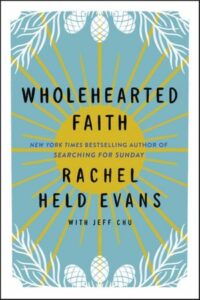 It is bittersweet to get to sell it; we know some have shed fresh tears upon learning of this final work of Held Evans. Beth and I had met Rachel a time or two and her tragic, sudden illness and death continues to make us sad. She was an important voice, naming the discontent many feel with overly strict evangelicalism and yet she remained a vibrant and even fierce supporter of creative Bible study, spiritual formation, public theology and reasonable, just, contemporary witness.
It is bittersweet to get to sell it; we know some have shed fresh tears upon learning of this final work of Held Evans. Beth and I had met Rachel a time or two and her tragic, sudden illness and death continues to make us sad. She was an important voice, naming the discontent many feel with overly strict evangelicalism and yet she remained a vibrant and even fierce supporter of creative Bible study, spiritual formation, public theology and reasonable, just, contemporary witness.
This forthcoming book is apparently formed around the manuscript she was working on at the time of her death, finished up and brought to fruition by her (and her husband’s) trusted friend, the good writer and journalist Jeff Chu. I’ve been re-reading his very important and deeply moving Does Jesus Really Love Me? A Gay Christian’s Pilgrimage in Search of God in America in which he travels around the country talking to gay Christians, (mostly evangelical), former evangelicals, former Christians, those confused by the topic, and even outright haters (like Westboro Baptist.) What a road trip! He’s brave and honest and funny and a good writer; he had joined with Held Evans (and their partner in crime, Sarah Bessey) to create the Evolving Faith conferences and podcast and continues that work even as he was drafted to help finish up Rachel’s last book. (Check that out here if you aren’t aware of their overall project and vision.)
Wholehearted Faith, by the way, is, at its core, the work-in-progress that Rachel had been writing at the time of her passing. There are other previously unpublished pieces, too, and Jeff has woven those together into this collection of essays as well. As the publisher promises:
This book is for the doubter and the dreamer, the seeker and the sojourner, those who long for a sense of spiritual wholeness as well as those who have been hurt by the Church but can’t seem to let go of the story of Jesus. Through theological reflection and personal recollection, Rachel wrestles with God’s grace and love, looks unsparingly at what the Church is and does, and explores universal human questions about becoming and belonging. An unforgettable, moving, and intimate book.
 This Here Flesh: Spirituality, Liberation, and the Stories That Make Us Cole Arthur Riley (Convergent) $26.00 OUR SALE PRICE = $20.80 DUE DATE FEBRUARY 22, 2022
This Here Flesh: Spirituality, Liberation, and the Stories That Make Us Cole Arthur Riley (Convergent) $26.00 OUR SALE PRICE = $20.80 DUE DATE FEBRUARY 22, 2022
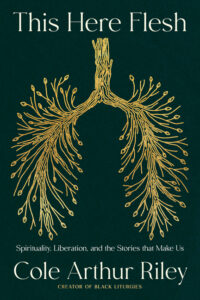 Oh my, my friends. Oh my. We don’t usually announce books this early — This Here Flesh debuts next winter (2-22-22) — but this is very, very special. I won’t say much about it here, now, as I want to do a more focused discussion of its substance and significance later as the date draws nearer (and once we see the real thing.) But since Random House, the big New York publishing house that owns Convergent has now released the cover and assigned it a bone fide place in their forthcoming 2022 catalogues, we just had to chime in and offer this opportunity for you to be among the first to know about what is going to be a very special book. And to get yourself on the growing waiting list. I wouldn’t wait to pre-order it from us if I were you, as this is going to be huge. Send us your order today!
Oh my, my friends. Oh my. We don’t usually announce books this early — This Here Flesh debuts next winter (2-22-22) — but this is very, very special. I won’t say much about it here, now, as I want to do a more focused discussion of its substance and significance later as the date draws nearer (and once we see the real thing.) But since Random House, the big New York publishing house that owns Convergent has now released the cover and assigned it a bone fide place in their forthcoming 2022 catalogues, we just had to chime in and offer this opportunity for you to be among the first to know about what is going to be a very special book. And to get yourself on the growing waiting list. I wouldn’t wait to pre-order it from us if I were you, as this is going to be huge. Send us your order today!
Please allow us to just say a few quick things with more coming later.
 Firstly, Cole Arthur Riley is a young black woman who has worked in various capacities in para-church campus ministry (currently at the very impressive Chesterton House at Cornell University.) We have known her for several years and have long admired her literary zeal (gotta love those lit and writing majors) and her sincere and deep evangelical faith. She is a solid and energetic thinker, an honest young follower of Jesus, and, yes, a woman increasingly finding her way as a black woman of faith in a largely white religious subculture. A black woman who knows that we all need help in finding ways to name who we are, whose we are, and what it means to live with integrity and care in these trying days. She knows something about, as the subtitle of her book puts it, “the stories that shape us.”
Firstly, Cole Arthur Riley is a young black woman who has worked in various capacities in para-church campus ministry (currently at the very impressive Chesterton House at Cornell University.) We have known her for several years and have long admired her literary zeal (gotta love those lit and writing majors) and her sincere and deep evangelical faith. She is a solid and energetic thinker, an honest young follower of Jesus, and, yes, a woman increasingly finding her way as a black woman of faith in a largely white religious subculture. A black woman who knows that we all need help in finding ways to name who we are, whose we are, and what it means to live with integrity and care in these trying days. She knows something about, as the subtitle of her book puts it, “the stories that shape us.”
As the publisher puts it:
In her stunning debut, the creator of Black Liturgies braids stories from three generations of her family alongside contemplative reflections to discover the necessary rituals that connect us with our belonging, dignity, and liberation.
As Ms Riley herself puts it:
From the womb, we must repeat with regularity that to love ourselves is to survive. I believe that is what my father wanted for me and knew I would so desperately need: a tool for survival, the truth of my dignity named like a mercy new each morning.
Her black family in Pittsburgh taught her well, but so did those in her college circles who read stuff like Reformed Public Theology (see above) that resists dualisms of the so-called secular vs the sacred; that is, she lives an embodied faith, a spirituality of the flesh, faith and life expressed in the not just in the abstract “real world” but in her own body, strong or frail as it may be. In what might be somewhat of a “coming of age” memoir, we will find a tender and forthright friend, a good, good writer who will help us all in our journey, trying to actually live as breathing, feeling, working, loving, human beings.
Again, quoting from the publishers PR —which is quite good! — we realize that this book will boldly explore, “some of the most urgent questions of life and faith: How can spirituality not silence the body, but instead allow it to come alive? How do we honor, lament, and heal from the stories we inherit?”
I have had good conversations with Cole, even about some of this very stuff, and listened to her teach and speak, and have been close with her husband as well. Beth and I admire them both as much as nearly any young adults we know. Gratefully, Cole started doing some creative writing, started up a well crafted and artful Instagram hashtag called “Black Liturgies.” Perhaps influenced by the very notion of the power of litanies and liturgies, healing and transformative rituals (she has read Jamie Smith, after all) her poetic pieces were designed to name her experiences and to call forth new hope. To offer encouragement and candor and blessing. Her Black Liturgies seem to be not quit devotionals, not exactly “to the barricades” calls to protest, not precisely poetry, and much more than inspirational social media memes (although some of the visually striking, reflective lines have been shared widely.)
They have been described as something within that social media space, just enough to be substantive, just allusive enough to cause you to ponder, just blunt enough to make some folks (well, some white folks, anyway) just a little uncomfortable, almost like hip hop prayers. Black Liturgies are unique and important and — yes! — they are increasingly known and shared by thousands of followers. We needn’t spill the beans but let’s just say even some fairly important public figures whose names you might know may be fans. Thanks be to God, Cole is a writer to watch.
Which, naturally, means the very best publishers are eager (as well they should be.) Hallelujah! Our young friend created (she would say with God’s guiding help) a huge Insta platform and has leveraged that into a contract for a major book by a major publisher. Who knows what can come of this?
Convergent/Random House is known in progressive and racial-justice seeking circles and is the publishing outfit who nicely got the excellent I’m Still Here by Austin Channing onto the national best sellers lists (with a nice assist from Reese Witherspoon’s Book Club.) It is the publishing house that did two of Nadia Bolz-Weber’s vivid books (I do hope you’ve read Accidental Saints) and the latest prayer book of Sarah Bessey and Richard Rohr’s last few. Here in the shop we just got in from Convergent The Unbroken Thread: Discovering the Wisdom of Tradition in an Age of Chaos, the major new (and quite hefty) volume by conservative Catholic apologist, Sohrab Ahmari. What a blast it is to think a friend and customer of ours is being published on this notable publishing house that has done Henri Nouwen and Madeline L’Engle and Jon Meacham and even an edited collection of Flannery O’Connor’s work! Holy smokes, Cole!
Just to further illustrate how important it is that This Here Flesh: Spirituality, Liberation, and the Stories That Make Us is coming out on Convergent, just realize that they are doing this fall the very long-awaited autobiography of Philip Yancey, the new memoir about illness by Ross Douthart and a forthcoming book next year by Kate Bowler. My, my, they’ve even got coming the great Truth’s Table: The Book by the brilliant podcasters Christina Edmondson, Michelle Higgins, and Ekemini Uwan (coming next March), so Ms. Riley is in very, very fine company. Her “indelible work of contemplative storytelling” will join that impressive roster of important writers and invite us to “ponder the site of soul” by examining our capacity to rest, wonder, joy, rage, and repair — to be human, renewed in Christ.
Like the other forthcoming books we are announcing here, you can pre-order Cole Arthur Riley’s at any time and we’ll get you on the list. We are offering This Here Flesh (and everything else mentioned) at our 20% off discounted price but we won’t charge your credit card until we send the books out. It know it seems a long way off, but we want to let the publisher know that this #blackliturgies book by a fine, young, black writer is in real demand. Send us your order today. It’s going to be fantastic and you will want to own it, for sure. Next year you can say, oh yeah, we learned about her through BookNotes, back in the summer of 2021.
ORDER ANY OR ALL OF THESE USING THE LINK TO THE ORDER PAGE BELOW.
It is very helpful if you would tell us how you prefer us to ship your orders. The weight and destination of your package varies but you can use this as a thumbnail, general guide.
There are generally two kinds of US Mail options, and, of course, UPS. If necessary, we can do overnight and other expedited methods, too. Let us know what you prefer.
- United States Postal Service has the option called “Media Mail” which is cheapest but slow and may be delayed. For one book, usually, it’s about $3.20.
- United States Postal Service has another option called “Priority Mail” which is about $7.00 or so for a few books and that gets much more attention than does “Media Mail.”
- UPS Ground is more reliable but about $8.00 or more for one or two books to most places.
DON’T FORGET TO LET US KNOW WHAT SHIPPING METHOD YOU PREFER.
BookNotes

SPECIAL
DISCOUNT
20% OFF
ALL BOOKS MENTIONED
+++
order here
this takes you to the secure Hearts & Minds order form page
just tell us what you want to order
inquire here
if you have questions or need more information
just ask us what you want to know
Hearts & Minds 234 East Main Street Dallastown PA 17313
read@heartsandmindsbooks.com
717-246-3333
We are still closed for in-store browsing due to our commitment to public health and the common good (not to mention the safety of our staff and customers.) The vaccination rate here in York County is sadly lower than average. We are doing fun, outdoor, backyard service, our famous curb-side delivery, and can show any number of items to you if you call us from our back parking lot. We are eager to serve and grateful for your patience as we all work to mitigate the ongoing pandemic.
Of course, we’re happy to ship books anywhere. Just tell us how you want them sent.
We are here 10:00 – 6:00 Monday – Saturday; closed on Sunday. Thanks for your support.
